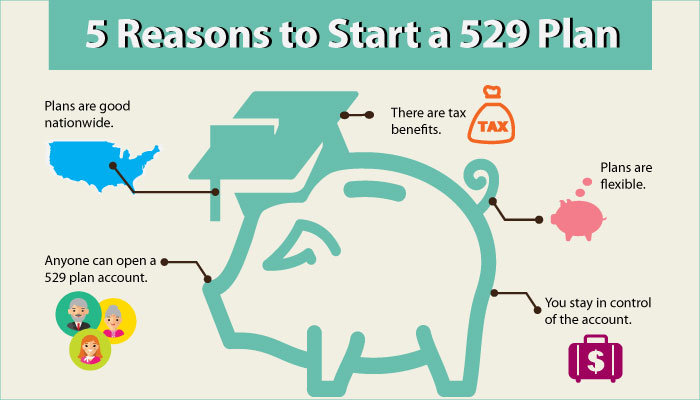Understanding 529 Accounts And Choosing The Right College Savings Account
When it comes to securing your child's educational future, choosing the right college savings account is a crucial decision. With the escalating costs of higher education, early planning and exploring various options are essential. One such option that has gained popularity is the 529 account—a tax-advantaged investment vehicle specifically designed for education expenses.
Author:James PierceReviewer:Camilo WoodJul 20, 2023265 Shares132.3K Views

When it comes to securing your child's educational future, choosing the right college savings account is a crucial decision. With the escalating costs of higher education, early planning and exploring various options are essential. One such option that has gained popularity is the529 account—a tax-advantaged investment vehicle specifically designed for education expenses.
We will provide an overview of college savings accounts, including an in-depth exploration of 529 accounts. By understanding the different types of college savings accounts and the advantages they offer, you can make an informed choice to set your child on a path to financial stability for their educational journey.
Types Of College Savings Accounts
Before diving into the specifics, it's important to understand the different types of college savings accounts available. Each type comes with its own set of advantages and disadvantages. Here are some common options to consider:
529 Prepaid Tuition Plan
A 529 prepaid tuition plan allows you to purchase future college credits at today's prices. These plans are typically backed by states and can provide a guaranteed rate of return. However, keep in mind that they may have limitations on where the funds can be used and may not cover room and board expenses.
529 Education Savings Plan
A 529 education savings plan offers more flexibility and allows you to invest money with the potential for growth. These plans provide various investment options, and the earnings can be used for a wide range of qualified education expenses. They are not limited to specific schools and can cover both tuition and room and board.
Coverdell ESA
A Coverdell Education Savings Account (ESA) is another option to consider. It offers the freedom to choose your investments and has looser standards for how the funds can be spent, including tuition for grades K-12. Coverdell ESAs can be beneficial if you have multiple children, as unused funds can be transferred to another beneficiary.
Custodial Accounts
Custodial accounts, such as UGMA (Uniform Gift to Minors Act) and UTMA (Uniform Transfer to Minors Act), are another choice. However, these accounts may impact financial aid eligibility and require the assets to be transferred to the child once they reach a certain age. They offer more flexibility in investment options but may not provide the same tax advantages as dedicated college savings accounts.

What Is The Best Option For College Savings?
Assessing Risk Tolerance And Timeframe
Determining your risk tolerance and the timeframe until you need the funds is crucial in making the right choice. Consider the following factors:
Risk Tolerance
If the safety of funds is your primary concern, a Section 529 prepaid tuition plan might be suitable. These plans offer guaranteed rates of return, protecting your investment from market fluctuations. However, keep in mind that they may not outperform the stock market in terms of long-term growth potential.
If you are willing to take on more risk in exchange for potentially higher returns, a Section 529 education savings plan or other investment options might be preferable. These plans allow you to invest in various securities and have the potential for growth based on market performance.
Timeframe
Consider the length of time until you will need to access the funds. If your child is young, a prepaid tuition plan could be beneficial as it allows you to lock in lower rates and accumulate credits over time. For longer timeframes, you might have more flexibility to invest more aggressively in the beginning and adjust the asset allocation as your child approaches college age.
State-Specific Benefits And Considerations
When choosing a college savings account, it's important to be aware of any state-specific benefits and considerations. Many states offer financial incentives for using their in-state Section 529 savings plans. These incentives can include tax deductions, credits, or even matching contributions up to certain limits.
Additionally, some states have specific plans tailored for private colleges and universities, such as the Private College 529 Plan. Evaluate the benefits offered by your state and determine if they align with your financial goals.
Contribution Capacity
Consider your ability to contribute to the college savings account. If you can save more than $2,000 per year, a Section 529 savings plan might be an ideal choice. These plans have higher contribution limits and allow for tax-deferred growth. Contributions to 529 plans are made with after-tax dollars, but the earnings can potentially be withdrawn tax-free when used for qualified education expenses.
If you cannot save $2,000 per year, a Coverdell ESA could be a suitable alternative. These accounts have lower contribution limits but still offer tax-advantaged growth potential.
After knowing your college savings options, one popular choice that deserves careful consideration is a 529 plan—a special savings plan designed specifically to help individuals save for education expenses. Let's explore what a 529 plan is, the advantages of a 529 plan, and why it deserves consideration as an investment option.
What Is A 529 Account Plan?
A 529 plan is a special savings plan that helps you save money for education expenses. It offers tax benefits, meaning you can save on taxes while saving for education. Originally, it was created to cover college costs, but now it can also be used for K–12 education, apprenticeship programs, paying off student loans, and even funding a retirement account called a Roth IRA. It's a flexible and powerful tool that can make education more affordable for you or your loved ones.
Why Should You Consider A 529 Plan?
As someone seeking the ideal investment opportunity to secure a bright future for your loved ones, a 529 plan offers compelling reasons to consider it as a valuable savings tool. Let's delve into the key advantages:
Savings For Education
A 529 plan is a tax-advantaged savings account specifically designed to help individuals save for education expenses. It serves as a dedicated savings vehicle for educational purposes, allowing you to accumulate funds over time to cover qualified education expenses.
Flexibility
One of the key benefits of a 529 plan is its flexibility. The funds in a 529 account can be used for a wide range of college expenses at accredited schools nationwide. Additionally, 529 plans can now be used for tuition expenses for K-12 education, certain apprenticeship costs, paying off student loans, and even funding a retirement account called a Roth IRA. This flexibility allows you to adapt the funds to meet various educational needs.
Control
Unlike a custodial account where the beneficiary gains control of the funds at a certain age, in a 529 plan, the account owner maintains ownership and control of the account until the money is withdrawn. This means that you have the authority to make investment decisions and can even change the beneficiary if plans change.
Tax Advantages
One of the most significant advantages of a 529 plan is its tax benefits. As long as the funds remain in the account, no income taxes are due on earnings. When you use the money to pay for qualified education expenses, the withdrawals are typically federal income tax-free, and in many cases, exempt from state taxes as well. This tax-advantaged growth can help your savings grow more efficiently over time.

What is a 529 plan?
Understanding 529 Plans
529 plans, named after Section 529 of the federal tax code, are education savings plans administered by the 50 states and the District of Columbia. These plans offer individuals a tax-advantaged way to save for education expenses. Whether you're a US resident of any income level or someone looking to support a loved one's educational journey, a 529 plan welcomes you.
Eligibility To Open A 529 Plan Account
Anyone who is a US resident, regardless of income level, can open a 529 plan account. To open an account, you must be at least 18 years old, have a US mailing and legal address, and possess a valid Social Security number or Tax ID.
Eligibility Of Beneficiaries
A beneficiary of a 529 plan account can be anyone who has a Social Security number or Tax ID, regardless of age. In some cases, the account owner can even designate themselves as the beneficiary.
Involvement Of Grandparents, Relatives, And Friends
Grandparents, relatives, and friends can play a vital role in saving for a child's education through a 529 plan. They have the option to open an account themselves or contribute money to an existing account. By gifting money to a 529 plan account, they can contribute to the child's future education expenses. Additionally, there may be estate tax benefits associated with gifting through a 529 plan.
Tax Advantages Of 529 Plans
One of the major advantages of a 529 plan is the tax benefits it offers. These tax advantages make 529 plans an attractive option for individuals looking to save for education expenses. Here are the key tax advantages associated with 529 plans:
Tax-Free Withdrawals
One of the most significant benefits of a 529 plan is the ability to make tax-free withdrawals. When you use the funds from a 529 plan for qualified educational expenses, both federal and state income taxes are exempted from the withdrawals.
This means that you can enjoy the growth of your savings without having to pay taxes on the earnings when they are used for educational purposes. It provides a valuable opportunity to maximize the value of your savings and minimize your tax burden.
Tax-Deferred Growth
In addition to tax-free withdrawals, 529 plans also offer tax-deferred growth. This means that the earnings on your contributions grow on a tax-deferred basis. As long as the funds remain in the account, no income taxes are due on the earnings.
This allows your savings to grow more efficiently over time, potentially resulting in a greater accumulation of funds for education expenses.
State Tax Benefits
While the contributions you make to a 529 plan are not tax-deductible for federal income tax purposes, many states provide tax incentives for contributing to a 529 plan. More than 30 states offer tax deductions or credits for contributions made to a 529 plan.
The specific tax benefits and eligibility criteria vary by state, so it's important to research the details of your state's plan. These state tax benefits can further enhance the overall tax advantages of a 529 plan and make it even more financially advantageous for you.
Avoidance Of Gift And Estate Taxes
529 plans also offer advantages in terms of gift and estate taxes. Contributions to a 529 plan are considered gifts for tax purposes. However, one unique feature of 529 plans is that you can utilize the annual gift tax exclusion amount to make contributions without incurring gift taxes.
As of 2023, you can contribute up to $15,000 per year ($30,000 for married couples filing jointly) without triggering the gift tax. Additionally, you have the option to "front-load" a 529 plan by making a lump-sum contribution of up to five times the annual exclusion amount ($75,000 per beneficiary or $150,000 for married couples) without incurring gift taxes. This can be a valuable strategy for maximizing your contributions while taking advantage of the gift tax rules.
Furthermore, contributions to a 529 plan may also help reduce your potential estate tax liability. Since contributions to a 529 plan are considered completed gifts, they are generally excluded from your taxable estate. This means that the funds in a 529 plan can be passed on to the beneficiary without incurring estate taxes, providing an efficient way to transfer wealth for educational purposes.
Exceptions And Penalties
It's important to note that any withdrawals from a 529 plan that are not used for qualified educational expenses may be subject to taxes and penalties. If you withdraw funds for non-qualified expenses, the earnings portion of the withdrawal is subject to federal income taxes at your ordinary income tax rate, along with a 10% federal penalty.
However, there are exceptions to the penalty, such as if the beneficiary receives a scholarship or attends a U.S. military academy. In such cases, earnings would still be subject to federal income tax and any applicable state and local taxes.
State Tax Deductions And Credits
In addition to the federal tax benefits, some states offer tax deductions or credits for contributions made to a 529 plan. These state tax benefits can vary widely, so it's important to review the details of your state's plan to understand the specific tax advantages that may be available to you based on your state of residence.
These state tax incentives can further enhance the overall tax advantages and make a 529 plan even more appealing from a tax perspective.

HOW TO USE A 529 ACCOUNT FOR TAX BENEFITS
Understanding the tax advantages of a 529 plan can help you make an informed decision when it comes to saving for education expenses. These tax benefits, including tax-free withdrawals, tax-deferred growth, potential state tax benefits, and the avoidance of gift and estate taxes, make 529 plans a powerful tool for maximizing your savings and minimizing your tax liability.
It's important to consult with a financial advisor or tax professional to understand the specific tax implications and benefits based on your individual circumstances and state of residence.
Advantages And Disadvantages Of 529 Plans
When considering a 529 plan, it's essential to weigh its advantages and disadvantages. Understanding both sides of the equation can help you make an informed decision about whether a 529 plan is the right choice for your education savings goals. Let's explore the pros and cons of 529 plans:
| Advantages of 529 Plans | Disadvantages of 529 Plans |
| High contribution limit | Limited investment options |
| Flexible plan location | Different fee levels per state |
| Easy to open and maintain | Restriction on changing plans |
| Tax-deferred growth | Restriction on switching investments |
| Tax-free withdrawals for qualified education expenses | Must be used for education |
| Tax-deductible contributions in some states | Depends on state; restrictions apply for tax deductions |
Consider these factors when deciding if a 529 plan is the right choice for your education savings goals.
People Also Ask
What Type Of 529 Plan Is Best?
The best 529 plans are:
- Best Overall- Ohio CollegeAdvantage
- Best for Big Savers- Utah my529
- Best Variety- Illinois Bright Start
- Best for Safe Investors- Virginia Invest529
- Best for Low Fees- New York NY's 529 College Savings Program
Which State Has The Lowest Fees For 529?
The 529 savings plans with the lowest cost are:
- Nevada- The Vanguard 529 Savings Plan
- West Virginia- SMART529 WV Direct College Savings Plan
- Virginia- Invest529
- New Hampshire- UNIQUE College Investing Plan (tie)
- Massachusetts U
- Delaware- Delaware College Investment Plan (tie)
What Are The Benefits Of A 529 Plan In Florida?
- Tax-deferred growth - Investments in the Florida 529 Savings Plan grow tax-deferred, allowing for maximum compound interest.
- Tax-free withdrawals -Withdrawals from the plan are tax-free as long as they are used for qualified higher education expenses.
Conclusion
In conclusion, a 529 account offers numerous benefits for individuals looking to save for education expenses. With its high contribution limit, flexible plan location, and tax advantages such as tax-deferred growth and tax-free withdrawals, a 529 account can be a powerful tool for achieving your education savings goals.
However, it's important to consider the limited investment options, varying fee levels, and restrictions associated with these accounts. By carefully weighing the advantages and disadvantages, you can determine if a 529 account is the right choice for your financial future.
Jump to
Types Of College Savings Accounts
Assessing Risk Tolerance And Timeframe
State-Specific Benefits And Considerations
Contribution Capacity
What Is A 529 Account Plan?
Why Should You Consider A 529 Plan?
Understanding 529 Plans
Tax Advantages Of 529 Plans
Advantages And Disadvantages Of 529 Plans
People Also Ask
Conclusion

James Pierce
Author

Camilo Wood
Reviewer
Latest Articles
Popular Articles

